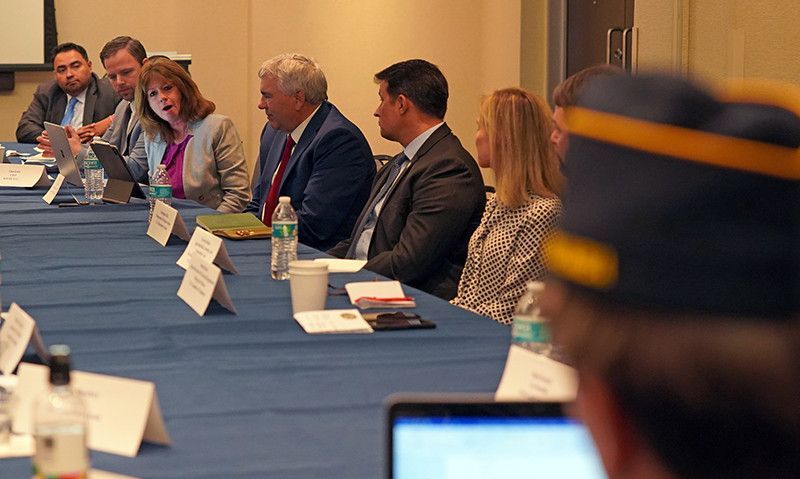
Over 1 million jobs in cybersecurity, health care
In just a couple of hours Monday, representatives of industry, government and higher education made it clear that military veterans have career opportunities in cybersecurity and skilled nursing – over 1 million opportunities.
“If you know cyber, you can get a job for life,” said former Marine Jason Shockey, chief executive officer of MyCyberPath.com, an online career-mapping platform to help veterans and others break into an industry with some 40,000 current openings in the federal government and another 700,000 or so vacancies in other sectors.
“I went from cleaning bathrooms as a young (Marine) to the help desk to a chief information security officer in the financial services industry,” he explained at a roundtable summit on higher education and credentialing put on by The American Legion’s Veterans Employment and Education Commission during the organization’s Washington Conference.
The term “cybersecurity” alone comes with many interpretations. The industry’s many pathways are often clouded by intimidation, confusion and a disconnect about what it really takes to find a job in the fast-growing industry with deep national-security ramifications. “There are two big myths,” Shockey said. “One is, I have to code, and, I’d have to know math, to be in cybersecurity. That’s not true.”
He said the MyCyberPath.com platform cross-references individual interests and personality traits with certification, education and training needs that can land career seekeers “their dream job in cyber.”
Shockey is a member of Task Force Movement’s (TFM) Cybersecurity Steering Committee. Initially focused on fast-tracking veterans to fill vacancies in the trucking industry after the task force was formed by the White House last April, Chairman Patrick Murphy announced at the 103rd American Legion National Convention four months later that cybersecurity is the second big portal for veterans looking to fill vital shortages in the U.S. economy.
Ankura Consulting Group senior director Neal Schubert, a cybersecurity leader with over a decade of military service, led that portion of the summit and said there are 68 different pathways for DoD cybersecurity jobs, and the industry’s place in civilization is not likely to diminish.
Cybersecurity, he told the group, “is based on Maslow’s hierarchy of needs. We’re breathing, drinking water, getting some good sleep, that’s the base level. Security and safety is the next level. The principles of what you do in cybersecurity, or information technology security – threat intelligence – is the same thing. Cybersecurity is a basic human need because now information technology is a part of our life.”
He said the TFM Cyber group will begin meeting in April to help bridge the gap between military-affiliated jobseekers and careers in an area not only of economic importance, but increasingly a national security concern.
Another area of need, one that has been a high priority for The American Legion for many years, is nursing. Ruth Parnell, co-founder of USA CareLiving, shared at the summit that the post-acute nursing shortage is nothing less than acute – with some 400,000 vacancies in long-term care, assisted living care and other specialized nursing jobs that pay well.
“They can’t afford to pay bottom line in long-term care,” Parnell said, noting that more than 1.5 million Americans are residents in nursing homes and assisted-living facilities, a number she says is expected to double by 2036. “(Demand) is too high. A CNA (certified nursing assistant) will make $60,000 - $70,000 a year.” And yet, those positions remain so understaffed, she explained, the industry is losing one in five to the workload.
The bridge between military experience and civilian careers in skilled nursing is complicated because the requirements vary across the country.
Parnell said that bridging that gap can solve to another problem – severe health-care shortages in rural areas “where the biggest need is right now. Because of COVID, and because of this shortfall in staffing, facilities are actually having to turn down patients. They are limited because of staffing ratios. It’s having this domino effect on small towns. A lot of small towns are losing their health care altogether.”
She said newly discharged veterans are a good match for such positions because they “want to go back home … get back into the communities that they want to be in. It’s going to stimulate everything.”
Different states, however, have different willingness to accept military experience in the credentialing process. “Our biggest challenge is that every board of nursing has a different set or regulations and rules. Some states are absolutely not going to participate. Others are more open, saying, ‘Bring us your credentialing, bring us your DD214 … your certifications, and we’ll work with you.’ Right now, it’s one by one, case by case, and everybody is different.”
Streamlining the process is a hurdle that must be cleared, she said, so that “we can get this vital work corps into healthcare and into those positions that need it so bad.”
Clearing such a flight paths – in health care and in cybersecurity – are at the heart of The American Legion’s efforts in recent years to better convert military training time into credits toward certification in talent-hungry career fields.
